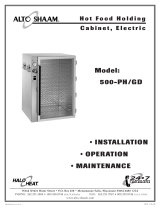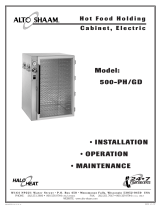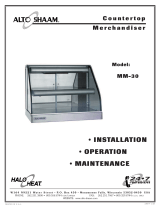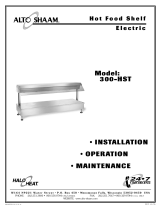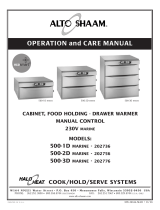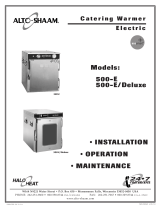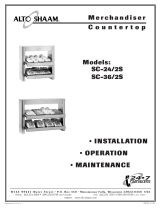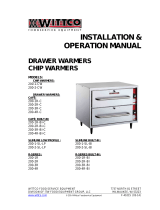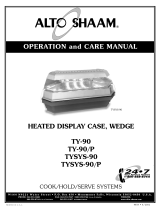
#818 I n s t a l la ti o n / O p e r a t i o n / Se r v i c e Ma n u a l • 11.
O P E R AT I O N
Chefs, cooks and other specialized food service
personnel employ varied methods of cooking. Proper
holding temperatures for a specific food product must
be based on the moisture content of the product,
product density, volume, and proper serving
temperatures. Safe holding temperatures must also
be correlated with palatability in determining the length
of holding time for a specific product.
Halo Heat maintains the maximum amount of product
moisture content without the addition of water, water
vapor, or steam. Maintaining maximum natural product
moisture preserves the natural flavor of the product and
provides a more genuine taste. In addition to product
moisture retention, the gentle properties of Halo Heat
maintain a consistent temperature throughout the
cabinet without the necessity of a heat distribution fan,
thereby preventing further moisture loss due to
evaporation or dehydration.
When product is removed from a high temperature
cooking environment for immediate transfer into
equipment with the lower temperature required for hot
food holding, condensation can form on the outside of
the product and on the inside of plastic containers used
in self-service applications. Allowing the product to
release the initial steam and heat produced by high
temperature cooking can alleviate this condition. To
preserve the safety and quality of freshly cooked foods
however, a maximum of 1 to 2 minutes must be the
only time period allowed for the initial heat to be
released from the product.
Most Halo Heat holding equipment is provided with
a thermostat control between 60° and 200°F
(16° to 93°C). If the unit is equipped with vents,
close the vents for moist holding and open the vents
for crisp holding.
If the unit is equipped with a thermostat indicating
a range of between 1 and 10, use a metal-stemmed
indicating thermometer to measure the internal
temperature of the product(s) being held. Adjust the
thermostat setting to achieve the best overall setting
based on internal product temperature.
H O L D I N G T E M P E R A T U R E R A N G E
MEAT FA H R E N H E I T C E L S I U S
B
EEF ROAST — Rare 140°F 60°C
BEEF ROAST — Med/Well Done 160°F 71°C
BEEF BRISKET 160° — 175°F 71° — 79°C
C
ORN BEEF 160° — 175°F 71° — 79°C
PASTRAMI 160° — 175°F 71° — 79°C
PRIME RIB — Rare 140°F 60°C
S
TEAKS — Broiled/Fried 140° — 160°F 60° — 71°C
RIBS — Beef or Pork 160°F 71°C
VEAL 160° — 175°F 71° — 79°C
H
AM 160° — 175°F 71° — 79°C
PORK 160° — 175°F 71° — 79°C
L
AMB 160° — 175°F 71° — 79°C
POULTRY
CHICKEN — Fried/Baked 160° — 175°F 71° — 79°C
D
UCK 160° — 175°F 71° — 79°C
TURKEY 160° — 175°F 71° — 79°C
GENERAL 160° — 175°F 71° — 79°C
F
ISH/SEAFOOD
FISH — Baked/Fried 160° — 175°F 71° — 79°C
LOBSTER 160° — 175°F 71° — 79°C
S
HRIMP — Fried 160° — 175°F 71° — 79°C
BAKED GOODS
BREADS/ROLLS 120° — 140°F 49° — 60°C
MISCELLANEOUS
CASSEROLES 160° — 175°F 71° — 79°C
DOUGH — Proofing 80° — 100°F 27° — 38°C
EGGS —Fried 150° — 160°F 66° — 71°C
FROZEN ENTREES 160° — 175°F 71° — 79°C
HORS D'OEUVRES 160° — 180°F 71° — 82°C
PASTA 160° — 180°F 71° — 82°C
PIZZA 160° — 180°F 71° — 82°C
POTATOES 180°F 82°C
PLATED MEALS 180°F 82°C
SAUCES 140° — 200°F 60° — 93°C
SOUP 140° — 200°F 60° — 93°C
VEGETABLES 160° — 175°F 71° — 79°C
The holding temperatures listed are suggested guidelines only.
GENERAL HOLDING GUIDELINES




















